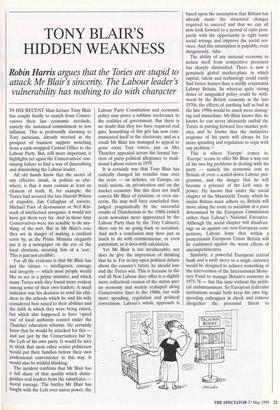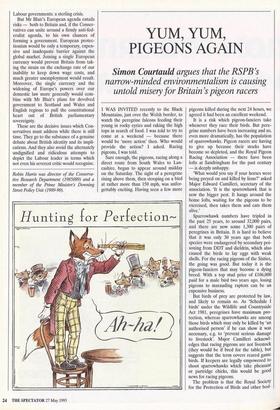TONY BLAIR'S HIDDEN WEAKNESS
Robin Harris argues that the Tories are stupid to
attack Mr Blair's sincerity. The Labour leader's vulnerability has nothing to do with character
IN HIS RECENT Mais lecture Tony Blair has sought finally to snatch from Conser- vatives their last economic accolade, namely the sustained commitment to low inflation. This is profoundly alarming to Tory tacticians, already worried at the prospect of business support switching from a cash-strapped Central Office to the Labour Party. But, still more important, it highlights yet again the Conservatives' con- tinuing failure to find a way of discrediting and diminishing the Labour leader.
All old hands know that the secret of any effective insult, in politics as else- where, is that it must contain at least an element of truth. If, for example, the Tories had accused the late Harold Wilson of stupidity, Jim Callaghan of naivete, Michael Foot of deviousness or Neil Kin- flock of intellectual arrogance it would not have got them very far. And in those days Conservatives were too sensible to do any- thing of the sort. But in Mr Blair's case they are in danger of making a cardinal error by, as the Prime Minister elegantly put it in a newspaper on the eve of the local elections, accusing him of a 'con'. This is just not credible.
For all the evidence is that Mr Blair has just the virtues — intelligence, courage and integrity — which most people would. like to see in a prime minister, and which many Tories wish they found more evident among some of their own leaders. A small indicator was his decision to send his chil- dren to the schools which he and his wife considered best suited to their abilities and the faith in which they were being raised, but which also happened to have 'opted out' of local authority control under the Thatcher education reforms. He certainly knew that he would be attacked for this and not just by the Conservatives but by the Left of his own party. It would be nice to think that most other senior politicians would put their families before their own Professional convenience in this way. It would also be wishful thinking.
The incident confirms that Mr Blair has a full share of that quality which distin- guishes real leaders from the substitutes moral courage. The battles Mr Blair has fought with the Left over union power, the Labour Party Constitution and economic policy may prove a sublime irrelevance to the realities of government. But there is no doubt that they too have required real guts. Something of this grit has now com- municated itself to the electorate; and as a result Mr Blair has managed to appeal to grass roots Tory voters, just as Mrs Thatcher appealed across the formal bar- riers of party political allegiance to tradi- tional Labour voters in 1979.
It is certainly true that Tony Blair has radically changed his socialist tune over the years — on defence, on Europe, on trade unions, on privatisation and on the market economy. But this does not itself convict Mr Blair of cynicism, or even sin- cerity. He may well have concluded that, judged pragmatically by the successful results of Thatcherism in the 1980s (which seem nowadays more appreciated by the Labour Party than by the Tory Cabinet), there can be no going back to socialism. And such a conclusion may have just as much to do with commonsense, or even patriotism, as it does with calculation.
Yet Mr Blair is not invulnerable; nor does he give the impression of thinking that he is. For in any open political debate about the country's future he should lose and the Tories win. This is because in the end all New Labour dare offer is a slightly more collectivist version of the status quo: an economy and society reshaped along Conservative lines in the 1980s, but with more spending, regulation and political correctness. Labour's whole approach is based upon the assumption that Britain has already made the structural changes required to succeed and that we can all now look forward to a period of calm pros- perity with the opportunity to right some social wrongs and improve the social ser- vices. And this assumption is palpably, even dangerously, false.
The ability of any national economy to isolate itself from competitive pressures has sharply diminished. There is now a genuinely global market-place in which capital, talent and technology could easily find better homes than a mildly corporatist Labour Britain. So whereas quite strong doses of misguided policy could be with- stood by the British economy in the late 1970s, the effects of anything half as bad in the late 1990s would be much more damag- ing and immediate. Mr Blair knows thig; he knows he can never ultimately outbid the Tories in putting forward free-market poli- cies; and he knows that the instinctive response of his party will always be for more spending and regulation to cope with any problem."
This is where 'Europe' comes in. `Europe' seems to offer Mr Blair a way out of his two big problems in dealing with his party — namely the economic cost to Britain of even a scaled-down Labour pro- gramme, and the danger that he will become a prisoner of the Left once in power. He knows that under the social chapter of the Maastricht Treaty, which he insists Britain must adhere to, Britain will move along the route to socialism at a pace determined by the European Commission rather than Labour's National Executive. Although the social chapter will disadvan- tage us as against our non-European com- petitors, Labour hope that within a protectionist European Union Britain will be cushioned against the worst effects of uncompetitiveness.
Similarly, a powerful European central bank and a swift move to a single currency would be designed to achieve something of the intervention of the International Mone- tary Fund to manage Britain's economy in 1975-76 — but this time without the politi- cal embarrassment. So European federalist institutions would both keep his own big- spending colleagues in check and remove altogether the perennial threat to Labour governments: a sterling crisis.
But Mr Blair's European agenda entails risks — both to Britain and, if the Conser- vatives can unite around a firmly anti-fed- eralist agenda, to his own chances of forming a government. European protec- tionism would be only a temporary, expen- sive and inadequate barrier against the global market. Joining a single European currency would prevent Britain from tak- ing the strain on the exchange rate of our inability to keep down wage costs, and much greater unemployment would result. Moreover, the single currency and the widening of Europe's powers over our domestic law more generally would com- bine with Mr Blair's plans for devolved government to Scotland and Wales and English regions to pull the constitutional heart out of British parliamentary sovereignty.
These are the decisive issues which Con- servatives must address while there is still time. They go to the substance of a genuine debate about British identity and its impli- cations. And they also avoid the alternately undignified and ridiculous attempts to depict the Labour leader in terms which not even his severest critic would recognise.
Robin Harris was director of the Conserva- tive Research Department (1985089) and a member of the Prime Minister's Downing Street Policy Unit (1989-90).



































































 Previous page
Previous page